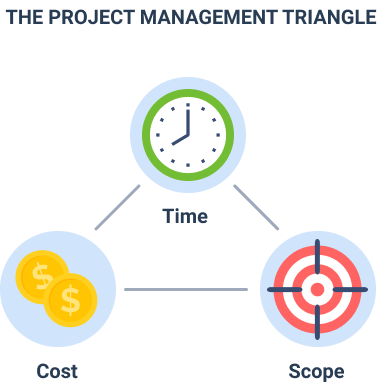
If you have a schedule but are still failing to deliver your projects on time, something is definitely wrong. And most probably, you main problem is an inadequate time management.
In this article, we will explain what makes time management such a significant contributor to project success and discuss everything that manageres and their teams need to do for managing time more effectively.
What Is Project Time Management?
Project time management is a crucial part of project management as a whole. It’s all about analyzing resource availability, designing reasonable project schedules and adopting effective management practices. Thereby, it helps you attain the formulated project performance goals by due dates and in a much more efficient way.
Why Is Project Time Management So Important?
In project management, time sets limits for every work activity. And as the Triple Constraint Theory suggests, the amount of time you have at your disposal can largely define how costly your project works will turn out in the end, as well as the overall scope of a project.

For example:
The fewer months you have to complete a project, the smaller the work scope you can realistically manage. Plus, depending on task complexity, tighter deadlines may entail higher project expenses in case you want to attain high-quality results without delays.
Hence, it’s pivotal to analyze your time resources in-depth, estimate and control them with the utmost attention – and that’s precisely what project time management strives to accomplish.
Already inspired to become a master of time management? Begin the path of improvement by trying out some of the recommendations given in this post and be sure to check our time management guide to deepen your knowledge.
5 Main Benefits of Project Time Management
When performed decently and diligently, project time management produces a plethora of benefits. It helps to:
- Boost productivity
- Avoid project delays and cost overruns
- Increase the efficiency and quality of work
- Improve forecasting and management results in your future projects
- Reduce stress (for managers and employees alike), prevent burnout and promote team morale
Overall, by implementing the right time management strategies and practices, you can achieve your project goals with greater ease while evading major financial loss and hidden costs of low productivity. No doubt, these benefits make time management one of the key ingredients in the recipe for project success.
6 Primary Processes in Project Time Management
Effective project time management involves at least six major processes:
- Project planning
- Task estimation
- Project scheduling
- Time tracking
- Team communication
- Analysis of time spent on tasks
Let’s have a brief look at each one of them below.
1. Project planning
It’s impossible to deliver a project successfully without a properly developed project management plan. You just have to know your goals, deliverables, capacities and needs well enough to make things right. Thus, starting any project with thorough planning is always a good thing.
When it comes to planning as part of time management, its main objective is to define the activities and tasks you should engage in to achieve the desired outcomes. A planning tool that you might find helpful in this regard is the Work Breakdown Structure (WBS). It calls for creating a detailed hierarchical chart depicting the entire work scope, starting with larger operational elements and ending with the smallest work packages. Once the WBS is fully developed, you will be able to decompose the identified work packages even further by pinpointing specific processes and tasks they comprise.
2. Estimation
Once you know what you need to do, you can proceed to estimate your project resources and costs. Be sure to start out with estimating everything but time because the availability of such resources as workforce, technology and money will define both your ability to meet productivity demands and work speed.
However, having a rough idea of when you want to complete your project is useful at this point. It will guide your analysis and allow you to understand how many resources it would be best to have. Afterward, you’ll be able to establish a more accurate schedule and deadlines. But to get there, you need to acquire as precise as possible time estimates first.
Only when you know how many members there’ll be in your team, how much money you’ll spend over the course of work, and how many pieces of essential equipment there’ll be at your disposal, you can arrive at adequate conclusions regarding the duration of your project. Apply those time estimation techniques that suit your case best, use quality evidence and pay attention to detail in the process. With accurate time estimates in hand, you may go over to the next step in project time management – scheduling.
3. Project scheduling
Scheduling is the arrangement of project activities and their durations in sequential order. Detailed and visual schedules work better. Hence, instead of making a plain task list with deadlines, be sure to create a proper project timeline.
What makes timelines so helpful is that they depict every project deliverable in a timebound format, taking into account all task dependencies and deadlines. Also, graphic task visualization helps to identify possible activity overlaps, control performance and communicate work objectives to your project team. Eventually, all this fosters better time management and superior work results.

4. Time tracking
After you start the actual work, your main goal in terms of time management is to adhere to the developed schedules and estimates. The only way to do so is by implementing effective control practices, and time tracking is one of the best among them.
To enhance control over the use of project time, consider applying a specialized software tool. Even a manual-entry time tracker is much more convenient than paper-and-pencil timesheets or digital spreadsheets. Such a tool helps to collect the necessary performance data, summarize the figures and present them in automatically generated reports at any moment.
actiTIME is an excellent example of a smart time tracking application. It allows users to record work hours both manually and automatically (via the Chrome extension). Besides, it contains some useful functionality for progress monitoring and controlling, including estimate tracking and automatic notifications on the risk of schedule overruns. Thus, with actiTIME, it’s incredibly easy to comply with your project schedules.
5. Project team communication
Time tracking is great for seeing how your staff members dispose of working hours, but it won’t help you encourage them to utilize time more efficiently. This issue can be handled merely through proper team communication, which allows you to:
- Motivate your employees to adopt productive time management techniques and behaviors,
- Convey your performance expectations to them,
- And make sure everybody understands project requirements correctly.
To converse with your project team members more successfully, you need to develop relevant skills, set clear goals, address structural barriers and promote employee trust. You can find more details on the topic in this informative article.
6. Time use analysis
Performance analysis is the most effective method to refine your time management skills, and it works well for individuals and businesses alike. Hence, to complete your project management cycle on the right note and learn from your experience, analyze team behaviors, workflows and the time spent on different tasks. This will let you identify any time wasters, undertake short-term adjustments and stimulate long-term improvements for better time management results in your future projects.
Time Is the Most Valuable of Project Resources
“Time is totally irreplaceable. Within limits we can substitute one resource for another, copper for aluminum, for instance. We can substitute capital for human labor. We can use more knowledge or more brawn. But there is no substitute for time.” – Peter Drucker
Time is a unique, irreplaceable yet always highly demanded resource. As a prominent management consultant and corporate business philosopher, Peter Drucker said in The Effective Executive, we can substitute and replenish every type of resource, but we cannot replace time with anything else. Moreover, time lost can never be restored, which makes it truly the most valuable resource we have.
That’s why it is so crucial to know how to manage your time right when working on projects of any kind. And hopefully, this brief guide to project time management has helped you to understand how to do just that.
















































